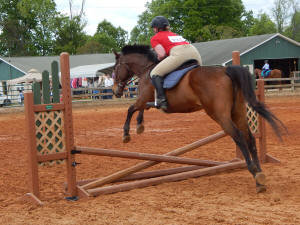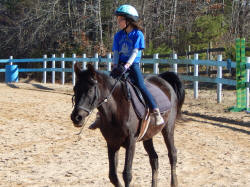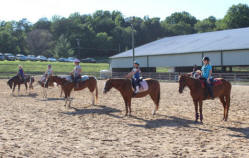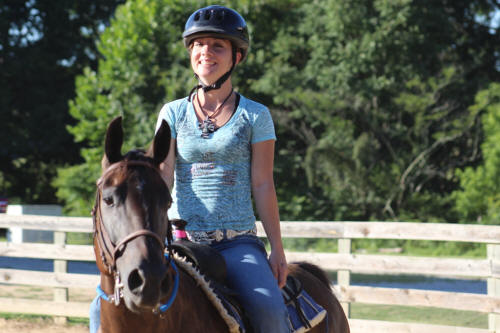|
 What
happened to good sportsmanship? What happened to helping
others? What happened to congratulating other riders if they
placed higher than you andencouraging
those that placed lower? When did winning at all costs
become more important than building up those younger or more
inexperienced? What
happened to good sportsmanship? What happened to helping
others? What happened to congratulating other riders if they
placed higher than you andencouraging
those that placed lower? When did winning at all costs
become more important than building up those younger or more
inexperienced?
It seems that riders lose sight of good sportsmanship when
it comes to winning. If they have a bigger, better, fancier,
more expensive horse and equipment, suddenly, that puts them
a mark above the rest. Even if it doesn't, people like to
feel set apart - special, newer, better. It's part of
competition and what creates a winning team - always feeling
the need to become more than what you have already become.
Unfortunately, more often than not, this creates discord and
competitors lose compassion for other riders and even their
horses in the process.
Having spent many years in the industry, I've spent time at
big shows and small, local shows in numerous states and
disciplines. What I've found, especially at a local level
close to home, is nothing less than dissapointing. My
generation was raised to compete with a smile, do good to
all, and apologize if you cut someone off. After ribbons
were handed out, we were expected to be kind. No matter
what. Even if you didn't place, you went and congratulated
the riders that did place, and found something nice to say,
as long as it was relevant. If you placed high and someone
else didn't, it was expected that you go to them and
encourage them, and compliment them in some way - tell them
how beautifully their horse was moving, how solid their
lower leg was, or something of the sort. Don't lie, but find
something nice to say - it goes a long way in building
others up, and can make the difference in a terrible day and
a pretty good one.
 If
someone had a question or wasn't well-versed in showing, it
was never a problem for them to ask someone else and get a
good answer. Everyone knew everyone else, and everyone
looked out for each other. A horse show was an event to look
forward to, because you knew you'd be spending the entire
day in the company of not only your barn family, but your
off-site barn family as well - the ones that you got to know
from going to show with their barns. If
someone had a question or wasn't well-versed in showing, it
was never a problem for them to ask someone else and get a
good answer. Everyone knew everyone else, and everyone
looked out for each other. A horse show was an event to look
forward to, because you knew you'd be spending the entire
day in the company of not only your barn family, but your
off-site barn family as well - the ones that you got to know
from going to show with their barns.
What has happened to that sportsmanship? When did riders
step away from realizing that horse shows are for fun? Their
purpose is to get to know others and further the horse
community, perhaps win some ribbons, and maybe even win back
some entry money. At a state and national level is one thing
- of course you're going to have high-dollar horses and
expensive outfits, and as a general rule, riders that can
afford a lot more - but it's entirely another thing at the
local level. When there is a show right down the road from
you that's advertised as a fun show or a schooling show,
you'd expect to be able to take your green horse over there
to school them and gain some experience. You'd expect to be
able to take some of your old school horses and let your
beginner students learn how to show.
Unfortunately, this is rarely the case anymore. In my
experience, there does tend to be some companionship
involved with several barns, but not right away - it tends
to have to build up over many years of building those
relationships before people will reach out and welcome you,
or help you out when you need it.
 At
these shows, you can hear other trainers, parents, the kids
themselves around the arena hanging out at the fence,
talking about the horses and riders they don't like, or have
problems with their performance. Sadly, rarely do they have
anything good to say - it's usually more along the lines of
gossip, unkind statements, and judgemental proclamations.
Sometimes, you won't hear anything at all, as they're saying
everything behind your back and don't want you to hear. You
won't hear the mean things they're saying, but you won't
hear anything kind or encouraging, either. At
these shows, you can hear other trainers, parents, the kids
themselves around the arena hanging out at the fence,
talking about the horses and riders they don't like, or have
problems with their performance. Sadly, rarely do they have
anything good to say - it's usually more along the lines of
gossip, unkind statements, and judgemental proclamations.
Sometimes, you won't hear anything at all, as they're saying
everything behind your back and don't want you to hear. You
won't hear the mean things they're saying, but you won't
hear anything kind or encouraging, either.
It's sad, really, how far we as a community have
stepped away from kindness, compassion, and
collaboration. We don't work together anymore. We
only work to tear each other down. We don't build up
our competition anymore, we only work harder on
ourselves and our horses and single ourselves out,
we must be better, do better, win better than
everyone else. Again, we lose sight of sportsmanship
and compassion when we feel lofty about being better
than everyone else. Bigger, better, more
expensive...these all contribute to the downfall of
sportsmanship.
Why? To What end? If it's a national competition, a
state competition, a big show, by all means, please,
do your best. But don't tear down others in your
path. You never know when it'll come back to haunt
you. Even if you are the best, and you have the best
horse, that is no reason whatsoever to treat others
around you like dirt. Spend the time to build others
up around you. Teach your children to make friends,
congratulate others, to find the best in every
situation. Shows are so much more fun when you're
there to have fun and do your best.
I always tell my students that it's okay if they
don't win, as long as they do their absolute best,
get the best performance they can out of their
horses, and enjoy the ride. I encourage them to find
something good about every class - they should come
out of every class with a positive note on something
that went well, whether they won or not. If they
didn't win, I try to help them analyze and
understand why they didn't place, and what they can
do next time to perform even better. But they are
never to come out of a class or a show with a rotten
attitude, any sort of entitlement ideas, or treating
other riders disrespectfully.
Can we get back to sportsmanship? Can we try to move
back towards a world where more than just your barn
mates care about you? Can we care more about our
horses and those around us than just ourselves and
winning a $2 ribbon? Can we teach our children, our
students, about good character, learning to have a
positive attitude, no matter the outcome or our
expectations?
This isn't to say that there aren't good people out
there, becuase there definitely are. This isn't a
universal truth, but unforutnately it's become far
more common than it should.
Please, become a part of this movement, and we can
change the horse industry, the future of our kids,
and the world.

For Example:
Perhaps you are attending a show at a new farm
for the first time, and you're hauling 4 of your own
school horses, all a little older and not quite as
fancy as could be expected. These horses are your
treasures, and they will pack your set of 7 year
olds around all day long without putting a foot
wrong. None of these kids can afford their own
horses, so they ride yours once a week in lessons.
They have second hand show clothes, or simple polo
shirt tucked into breeches, with paddock boots and
half chaps, and hair done up in pretty little
braids.
Your girls happily tack up their horses and take
them into the warmup ring. They've been well coached
ahead of time, reminded once more of ring etiquette,
passing properly, excusing themselves if they goof
up, and calling their jumps. Their classes
begin.....and riders cut these girls off
intentionally to try to make their horses break gait
or otherwise act out in front of the judge, they are
squeezed into the corners and crowded so that they
judge can't get a good eye on them. They do their
best, check their diagonals and leads, keep their
horses as consistant as possible. The other riders
are checking their horses HARD when the judge isn't
watching, and heavy-handed in their horse's mouths
trying to frame up perfectly and force their horses
to go as they are asked. There is little to no
consideration for the horses themselves, or for any
other riders in the arena - as long as they win,
that's all that matters.
The children do their best, they line up, they give
their horses a pat on the neck and tell their horses
thank you for doing their best. They are exercising
compassion. The other children in the class look at
them sideways, wondering why they are
talking....goodness, that can't be okay. Your girls
look over and smile, and tell them that they did
well, that their horse is very pretty, what's it's
name? The judge is finished pinning the class at
this point, and they are only waiting on the
announcer. Once the places are called, it turns out
that several of your girls placed low, and the other
kids with better, bigger, fancier horses and clothes
placed in the high ribbons. Your girls happily trot
to pick up their ribbons, go get their picture
taken, and congratulate the girls with their horses
that placed high. It's a small show, so they are
here to make friends, see the pretty horses, win
some ribbons, do their best, and go home having had
a day full of fun.
This continues the remainder of the day. Your kids
get a few things wrong....miss a diagonal here, a
lead there, and it's reflected in their ribbons.
It's a learning experience, and they walk away from
each class knowing what they could do better, and
you give them coaching on what they did correctly.
At the end of the day, they've done fairly well, and
you're happy with their progress. They showed well,
they kept a good attitude, watched a lot, and
learned a lot.
How do you explain how it's fair that the riders
with more expensive, bigger, fancier horses placed
better just because of how they look? It's an
unfortunate truth, and that's okay. It's okay that
some horses just look and move better than others.
Your kids have learned that they can do things to
make their horses look and move better, but
sometimes it's just not good enough. They've learned
that it's okay to not be first all the time. They've
learned that it's important to be a good sport, even
if you're not number one. It's important to support
your teammates, and to congratulate your
competition. There were several classes where your
kids placed higher than the ones that typically won
the classes, due to a bobble in their horses, a
missed lead, or one child nearly running the judge
over cutting across the arena. In those instances,
your girls were over the moon that they had placed
so high. Unforutnately, the riders that they beat
did not consider it alright - they complained loudly
to their parents, trainers, and anyone else that
would listen how unfair it was.
Encourage your riders, and yourself, to do your
best, to congratulate others, to have compassion and
caring above all else. You'd be amazed at the
difference it'll make. |
|


 If
someone had a question or wasn't well-versed in showing, it
was never a problem for them to ask someone else and get a
good answer. Everyone knew everyone else, and everyone
looked out for each other. A horse show was an event to look
forward to, because you knew you'd be spending the entire
day in the company of not only your barn family, but your
off-site barn family as well - the ones that you got to know
from going to show with their barns.
If
someone had a question or wasn't well-versed in showing, it
was never a problem for them to ask someone else and get a
good answer. Everyone knew everyone else, and everyone
looked out for each other. A horse show was an event to look
forward to, because you knew you'd be spending the entire
day in the company of not only your barn family, but your
off-site barn family as well - the ones that you got to know
from going to show with their barns. At
these shows, you can hear other trainers, parents, the kids
themselves around the arena hanging out at the fence,
talking about the horses and riders they don't like, or have
problems with their performance. Sadly, rarely do they have
anything good to say - it's usually more along the lines of
gossip, unkind statements, and judgemental proclamations.
Sometimes, you won't hear anything at all, as they're saying
everything behind your back and don't want you to hear. You
won't hear the mean things they're saying, but you won't
hear anything kind or encouraging, either.
At
these shows, you can hear other trainers, parents, the kids
themselves around the arena hanging out at the fence,
talking about the horses and riders they don't like, or have
problems with their performance. Sadly, rarely do they have
anything good to say - it's usually more along the lines of
gossip, unkind statements, and judgemental proclamations.
Sometimes, you won't hear anything at all, as they're saying
everything behind your back and don't want you to hear. You
won't hear the mean things they're saying, but you won't
hear anything kind or encouraging, either. 